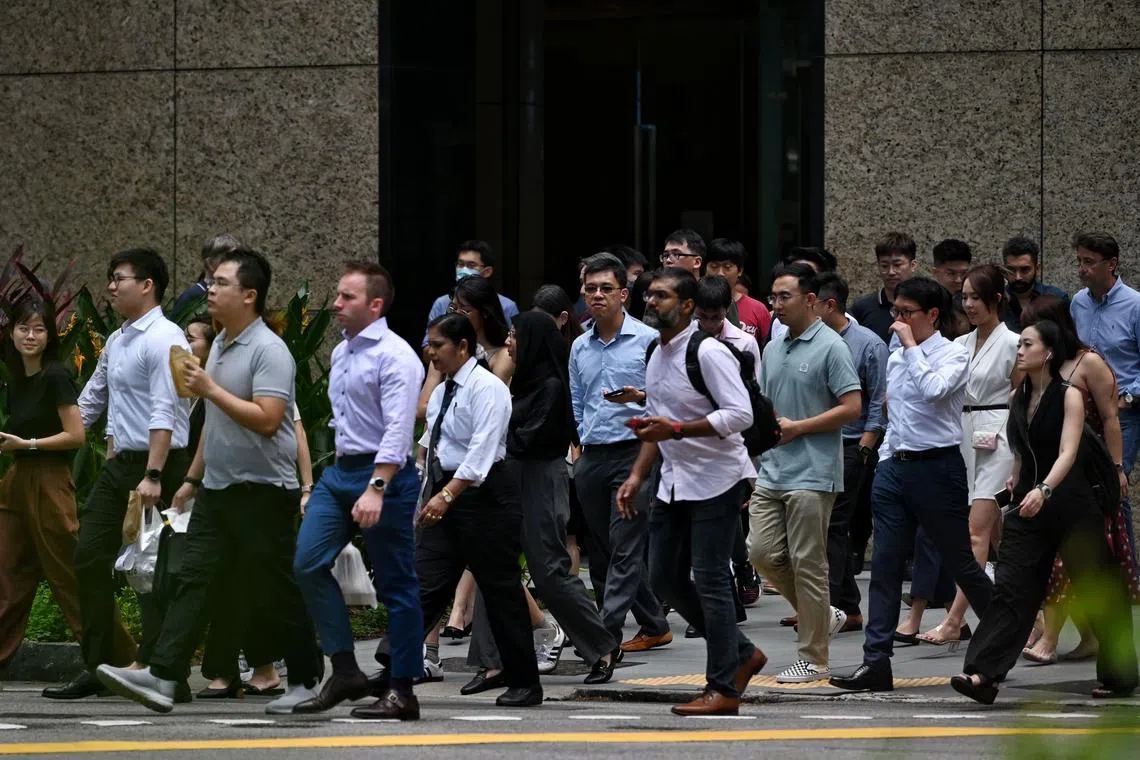S’pore added 380,000 resident PMETs over past decade; resident income up 21.6% in real terms
Sign up now: Get ST's newsletters delivered to your inbox

Over the same period, the number of Employment Pass and S Pass holders increased by 50,000.
PHOTO: ST FILE
SINGAPORE – The number of Singapore resident professionals, managers, executives and technicians (PMETs) grew by 380,000 between 2013 and 2023, or more than seven times the growth of foreigners in similar jobs.
Over the same period, the number of Employment Pass (EP) and S Pass holders increased by 50,000, Minister for Manpower Tan See Leng told Parliament.
He gave these figures on April 2 in response to Workers’ Party MP Gerald Giam (Aljunied GRC), who asked how the Ministry of Manpower (MOM) would ensure the bulk of new jobs created in 2024 will go to Singapore citizens and residents, including those aged 40 and above.
Dr Tan added that in growth sectors such as finance, infocomm and professional services, resident PMETs increased by 190,000, while the number of EP and S Pass holders increased by 20,000 between 2013 and 2023.
“Residents” refers to both Singaporeans and permanent residents.
“More importantly, over the decade, resident income has also increased by 21.6 per cent in real terms, so we must not view residents and foreigners as a zero-sum game and continue to draw divides,” Dr Tan said.
“Thriving businesses with access to complementary foreign talent will not only lead to more job creation, but also improved overall wage outcomes as businesses expand and improve their productivity.”
He noted: “By growing our economic pie, we will be better able to secure positive outcomes for Singapore and Singaporeans.”
Singapore’s foreign workforce policies have the fundamental objective of balancing between providing businesses access to the skills and manpower they need and creating jobs for local workers to grow and progress in – an approach that has helped locals secure good jobs that they want to do, Dr Tan said.
With slowing resident workforce growth, Singapore needs to remain open to complementary foreign labour to meet the demands of its growing economy and businesses, he added.
This is especially so as there is a global shortage of skilled talent, with global cities competing for both investments and human capital.
The minister noted that although the lion’s share – 83,500 – of the 88,400 workers added in 2023
The total number of EP and S Pass holders combined is still below pre-Covid-19 levels, he said.
The remaining foreign employment growth of 64,800 was due to a net increase in the number of holders of work permits and other work passes in sectors such as construction, which he noted are not typically the type of jobs that Singaporeans want to do.
Dr Tan also said employment of foreign PMETs is still recovering from the impact of the Covid-19 pandemic.
“Resident employment increased every year since 2019, (with) the proportion of PMETs amongst employed residents increasing in tandem as well,” Dr Tan added.
“Hence, the larger proportion of growth attributed to EP and S Pass holders last year did not affect PMET resident employment at all.”
He cited measures to ensure employers bring in the right profile of foreign workers to complement the local workforce, such as salary benchmarks that ensure locals can compete on a level playing field with high-quality foreign talent.
Dr Tan also noted that the Republic’s resident employment rate of 66.2 per cent in 2023 is the fourth-highest such rate, compared with other advanced economies in the Organisation for Economic Cooperation and Development.
The annual average resident unemployment rate for 2023 was 2.7 per cent and the resident long-term unemployment rate was 0.7 per cent in December, which shows the Republic is close to full employment, he said.
From 2020 to 2022, resident employment grew by more than 110,000, while foreign employment declined by 3,000 over the same period, which Dr Tan said shows the Government’s efforts to safeguard resident employment.
Mr Giam also asked if government expenditure on job creation disproportionately benefits multinational corporations and foreign professionals.
To this, Dr Tan said thriving businesses in a growing economy need continued access to local and foreign talent, even when Singapore is already close to full employment.
He asked: “Is (Mr Giam) therefore suggesting that because we’re at full employment, we put a dampener on our businesses’ ability to grow?”
Mr Giam and Non-Constituency MP Leong Mun Wai also sought a breakdown of labour data for Singaporeans and permanent residents.
Dr Tan said the topic has been addressed in previous ministerial statements. He had said in a ministerial statement in 2021 that the Government provides the unemployment rate for Singapore citizens.
The latest rate for citizens was 3 per cent in January 2024, while that for citizens and permanent residents combined was 2.8 per cent.


